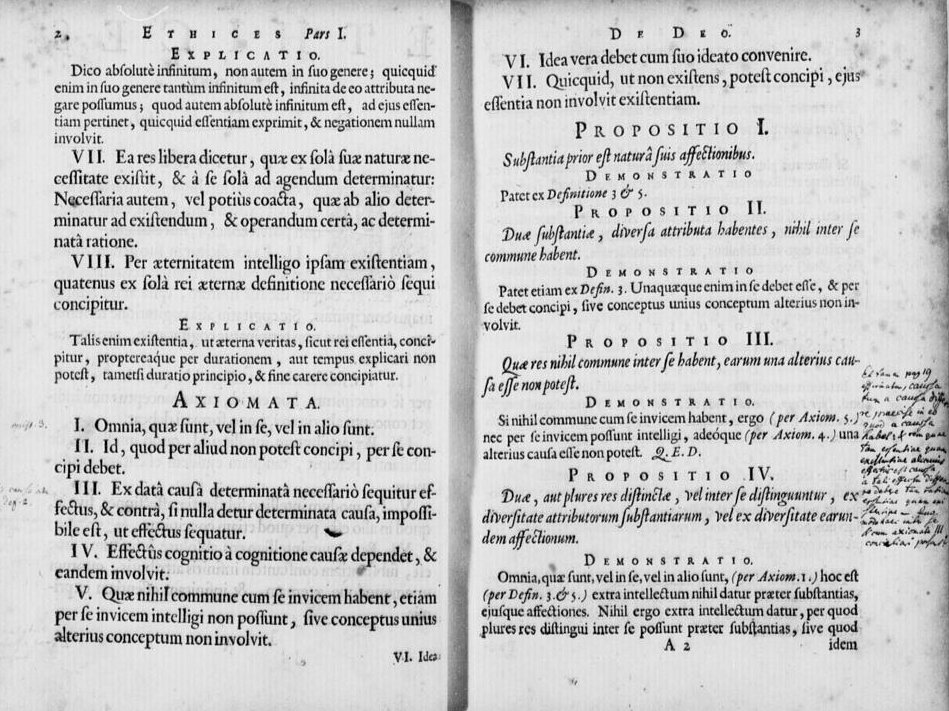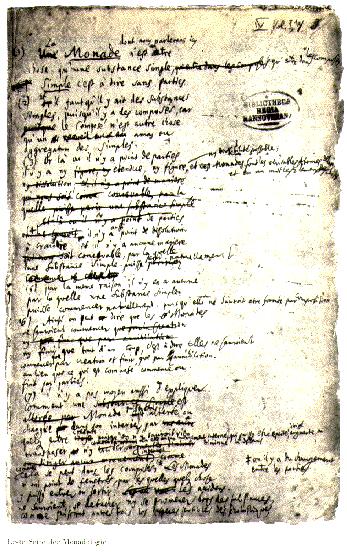|
Mental Substance
Mental substance, according to the idea held by Mind-body dualism, dualists and idealism, idealists, is a non-physical substance of which minds are composed. This substance is often referred to as consciousness. This is opposed to the view of materialism, materialists, who hold that what we normally think of as mental substance is ultimately physical matter (i.e., brains). René Descartes, who was most famous for the assertion "I think therefore I am", played a major role in developing the mind–body problem. He describes his theory of mental substance (which he calls ''res cogitans'' distinguishing it from the ''res extensa'') in the ''Second Meditations on First Philosophy, Meditation'' (II.8) and in ''Principia Philosophiae'' (2.002). He used a more precise definition of the word "substance" than is currently popular: that a substance is something which can exist without the existence of any other substance. For many philosophers, this word or the phrase "mental substance" h ... [...More Info...] [...Related Items...] OR: [Wikipedia] [Google] [Baidu] |
Concepts In Metaphysics
A concept is an abstract idea that serves as a foundation for more concrete principles, thoughts, and beliefs. Concepts play an important role in all aspects of cognition. As such, concepts are studied within such disciplines as linguistics, psychology, and philosophy, and these disciplines are interested in the logical and psychological structure of concepts, and how they are put together to form thoughts and sentences. The study of concepts has served as an important flagship of an emerging interdisciplinary approach, cognitive science. In contemporary philosophy, three understandings of a concept prevail: * mental representations, such that a concept is an entity that exists in the mind (a mental object) * abilities peculiar to cognitive agents (mental states) * Fregean senses, abstract objects rather than a mental object or a mental state Concepts are classified into a hierarchy, higher levels of which are termed "superordinate" and lower levels termed "subordinate". Add ... [...More Info...] [...Related Items...] OR: [Wikipedia] [Google] [Baidu] |
Johannes Jacobus Poortman
Johannes Jacobus Poortman (April 26, 1896 in Rotterdam – December 21, 1970 in The Hague), studied philosophy and psychology at Groningen University under Professor Gerardus Heymans. In 1919 he received his Master of Arts; many years later he would also earn a Ph.D. He was also a theosophist. Biography Poortman studied at the universities of Hamburg, Geneva, the Sorbonne in Paris and at Vienna. From 1932 to 1938 he was member of the Council of the Dutch Society for Psychical Research. From 1958 to 1966 he was a Professor of metaphysics at the University of Leiden. After he retired his chair was successively occupied by Prof. Dubbink, Prof. van Vledder and Prof. Gerding. Poortman was the maker of the Repertory of Dutch philosophers, Repertorium der Nederlandse Wijsbegeerte, which can be consulted on line at the site of the Leiden University. He formulated the idea of a ''hylic pluralism'' (in Dutch ''hylisch pluralisme'') of the plurality of matter, a model of the universe ... [...More Info...] [...Related Items...] OR: [Wikipedia] [Google] [Baidu] |
Pluralism (philosophy Of Mind)
Pluralism is a term used in philosophy, referring to a worldview of multiplicity, often used in opposition to monism (the view that all is one) or dualism (the view that all is two). The term has different meanings in metaphysics, ontology, epistemology and logic. In metaphysics, it is the view that there are in fact many different substances in nature that constitute reality. In ontology, pluralism refers to different ways, kinds, or modes of being. For example, a topic in ontological pluralism is the comparison of the modes of existence of things like 'humans' and 'cars' with things like 'numbers' and some other concepts as they are used in science. In epistemology, pluralism is the position that there is not one consistent means of approaching truths about the world, but rather many. Often this is associated with pragmatism, or conceptual, contextual, or cultural relativism. In the philosophy of science it may refer to the acceptance of co-existing scientific paradigms whic ... [...More Info...] [...Related Items...] OR: [Wikipedia] [Google] [Baidu] |
Monism
Monism attributes oneness or singleness () to a concept, such as to existence. Various kinds of monism can be distinguished: * Priority monism states that all existing things go back to a source that is distinct from them; e.g., in Neoplatonism everything is derived from The One. In this view only the One is ontologically fundamental or prior to everything else. * Existence monism posits that, strictly speaking, there exists only a single thing, the universe, which can only be artificially and arbitrarily divided into many things. * Substance monism asserts that a variety of existing things can be explained in terms of a single reality or substance. Substance monism posits that only one kind of substance exists, although many things may be made up of this substance, e.g., matter or mind. * Dual-aspect monism is the view that the mental and the physical are two aspects of, or perspectives on, the same substance. * Neutral monism believes the fundamental nature of reality to be ... [...More Info...] [...Related Items...] OR: [Wikipedia] [Google] [Baidu] |
Dualism (philosophy Of Mind)
Dualism most commonly refers to: * Mind–body dualism, a philosophical view which holds that mental phenomena are, at least in certain respects, not physical phenomena, or that the mind and the body are distinct and separable from one another * Property dualism, a view in the philosophy of mind and metaphysics which holds that, although the world is composed of just one kind of substance—the physical kind—there exist two distinct kinds of properties: physical properties and mental properties * Cosmological dualism, the theological or spiritual view that there are only two fundamental concepts, such as "good" and "evil", and that these two concepts are in every way opposed to one another Dualism may also refer to: * Dualism (cybernetics), systems or problems in which an intelligent adversary attempts to exploit the weaknesses of the investigator * Dualism (Indian philosophy), the belief held by certain schools of Indian philosophy that reality is fundamentally composed of t ... [...More Info...] [...Related Items...] OR: [Wikipedia] [Google] [Baidu] |
Res Extensa
''Res extensa'' is one of the two substances described by René Descartes in his Cartesian ontology (often referred to as "radical dualism"), alongside '' res cogitans''. Translated from Latin, "''res extensa''" means "extended thing" while the latter is described as "a thinking and unextended thing". Descartes often translated ''res extensa'' as "corporeal substance" but it is something that only God can create. ''Res extensa'' vs. ''res cogitans'' ''Res extensa'' and ''res cogitans'' are mutually exclusive and this makes it possible to conceptualize the complete intellectual independence from the body. ''Res cogitans'' is also referred to as the soul and is related by thinkers such as Aristotle in his ''De Anima'' to the indefinite realm of potentiality. On the other hand, ''res extensa'', are entities described by the principles of logic and are considered in terms of definiteness. Due to the polarity of these two concepts, the natural science focused on ''res extensa''. ... [...More Info...] [...Related Items...] OR: [Wikipedia] [Google] [Baidu] |
Ethics (Spinoza Book)
''Ethics, Demonstrated in Geometrical Order'' () is a philosophical treatise written in Latin by Baruch Spinoza (). It was written between 1661 and 1675 and was first published wikt:posthumous, posthumously in 1677. The ''Ethics'' is perhaps the most ambitious attempt to apply Euclid's Euclid's Elements#Euclid's method and style of presentation, method in philosophy. Spinoza puts forward a small number of definitions and axioms from which he attempts to derive hundreds of propositions and corollaries, such as "when the Mind imagines its own lack of power, it is saddened by it", "a free man thinks of nothing less than of death", and "the human Mind cannot be absolutely destroyed with the Body, but something of it remains which is eternal." Summary Part I: Of God The first part of the book addresses the relationship between God and the universe. Spinoza was engaging with a Abrahamic religions, tradition that held that God exists outside of the universe, that God created the uni ... [...More Info...] [...Related Items...] OR: [Wikipedia] [Google] [Baidu] |
Spinoza
Baruch (de) Spinoza (24 November 163221 February 1677), also known under his Latinized pen name Benedictus de Spinoza, was a philosopher of Portuguese-Jewish origin, who was born in the Dutch Republic. A forerunner of the Age of Enlightenment, Spinoza significantly influenced modern biblical criticism, 17th-century rationalism, and Dutch intellectual culture, establishing himself as one of the most important and radical philosophers of the early modern period. Influenced by Stoicism, Thomas Hobbes, René Descartes, Ibn Tufayl, and heterodox Christians, Spinoza was a leading philosopher of the Dutch Golden Age. Spinoza was born in Amsterdam to a Marrano family that fled Portugal for the more tolerant Dutch Republic. He received a traditional Jewish education, learning Hebrew and studying sacred texts within the Portuguese Jewish community, where his father was a prominent merchant. As a young man, Spinoza challenged rabbinic authority and questioned Jewish doctrines, lea ... [...More Info...] [...Related Items...] OR: [Wikipedia] [Google] [Baidu] |
Monadology
The ''Monadology'' (, 1714) is one of Gottfried Leibniz's best known works of his later philosophy. It is a short text which presents, in some 90 paragraphs, a metaphysics of simple substances, or '' monads''. Text During his last stay in Vienna from 1712 to September 1714, Leibniz wrote two short texts in French which were meant as concise expositions of his philosophy. After his death, ''Principes de la nature et de la grâce fondés en raison'', which was intended for prince Eugene of Savoy, appeared in French in the Netherlands. Christian Wolff and collaborators published translations in German and Latin of the second text which came to be known as ''The Monadology''. Without having seen the Dutch publication of the ''Principes'' they had assumed that it was the French original of the ''Monadology,'' which in fact remained unpublished until 1840. The German translation appeared in 1720 as ''Lehrsätze über die Monadologie'' and the following year the ''Acta Eruditorum' ... [...More Info...] [...Related Items...] OR: [Wikipedia] [Google] [Baidu] |
Monad (philosophy)
The term ''monad'' () is used in some cosmic philosophy and cosmogony to refer to a most basic or original substance. As originally conceived by the Pythagoreans, the Monad is therefore Supreme Being, divinity, or the totality of all things. According to some philosophers of the early modern period, most notably Gottfried Wilhelm Leibniz, there are infinite monads, which are the basic and immense forces, elementary particles, or simplest units, that make up the universe. Historical background According to Hippolytus, the worldview was inspired by the Pythagoreans, who called the first thing that came into existence the "monad", which begat (bore) the dyad (from the Greek word for two), which begat the numbers, which begat the point, begetting lines or finiteness, etc. It meant divinity, the first being, or the totality of all beings, referring in cosmogony (creation theories) variously to source acting alone and/or an indivisible origin and equivalent comparators. Py ... [...More Info...] [...Related Items...] OR: [Wikipedia] [Google] [Baidu] |


